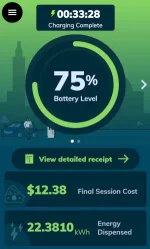krikorr
2023 Electrified GV70 owner
- Joined
- Aug 28, 2022
- Messages
- 133
- Reaction score
- 52
- Points
- 28
- Location
- Lehigh Valley PA
- Genesis Model Year
- 2023
- Genesis Model Type
- Genesis GV70 EV
FYI, here's a copy of my reply to the question, why aren't thee more EVs in the USA?
Electrically powered vehicles are what is known as a disruptive technology as are were the Internet, PC’s and cell phones. Experience has shown any disruptive technology will have to overcome resistance on two fronts. First is the reluctance of people to change basic elements of their lives (there is nothing easier to use than what you already know). Second is the resistance of the technologies being replaced. It takes a while for these resistances to be overcome. Some of the factors impacting the time it takes to overcome the resistance are: how steep is the learning curve, the cost of adoption, the perceived benefit, Government support/opposition, and the financial, political, and social power of the technologies being disrupted. Adoption usually follows the "hockey stick" graph. A long period of low adoption and then a period of rapid (sometimes geometric) adoption. But can something as fundamental to our society as the ICE powered car be replaced? Here are two pictures which show you the same portion of 5th Ave, NYC some 13 years apart. The 1900 picture contains only one discernable 1 horseless carriage.

5th Avenue, NYC Easter 1900

5th Avenue, NYC Easter 1913
Just 13 years later, the same location shows only one horse drawn carriage!
I think the graph below, prepared by the US Dept of Energy, indicates we have entered the phase of rapid EV adoption. Notice the steep rise from ~2% to ~6% in EV sales between12/20 and 12/22. Many estimates predict the EV share of new cars and light trucks sold in the US by 2030 will be between 35% - 65%. If that estimate is accurate, around 5-million EVs will be sold in 2030 in the US.

Electric Car Adoption Estimates
Electrically powered vehicles are what is known as a disruptive technology as are were the Internet, PC’s and cell phones. Experience has shown any disruptive technology will have to overcome resistance on two fronts. First is the reluctance of people to change basic elements of their lives (there is nothing easier to use than what you already know). Second is the resistance of the technologies being replaced. It takes a while for these resistances to be overcome. Some of the factors impacting the time it takes to overcome the resistance are: how steep is the learning curve, the cost of adoption, the perceived benefit, Government support/opposition, and the financial, political, and social power of the technologies being disrupted. Adoption usually follows the "hockey stick" graph. A long period of low adoption and then a period of rapid (sometimes geometric) adoption. But can something as fundamental to our society as the ICE powered car be replaced? Here are two pictures which show you the same portion of 5th Ave, NYC some 13 years apart. The 1900 picture contains only one discernable 1 horseless carriage.
5th Avenue, NYC Easter 1900
5th Avenue, NYC Easter 1913
Just 13 years later, the same location shows only one horse drawn carriage!
I think the graph below, prepared by the US Dept of Energy, indicates we have entered the phase of rapid EV adoption. Notice the steep rise from ~2% to ~6% in EV sales between12/20 and 12/22. Many estimates predict the EV share of new cars and light trucks sold in the US by 2030 will be between 35% - 65%. If that estimate is accurate, around 5-million EVs will be sold in 2030 in the US.
Electric Car Adoption Estimates










